The Industrialisation of Agriculture
 Thursday, February 20, 2014 at 10:51PM
Thursday, February 20, 2014 at 10:51PM Our class on the industrialisation of agriculture started with a simple game of word association. Professor Harry West asked us to think of terms that we associated with this idea. These were the results:
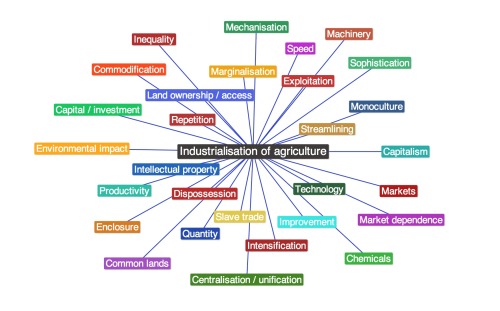
When we had completed the task, Harry made an interesting point. He highlighted that any term that evokes this many associations is complex by nature. For this reason we can’t rely on the term to say any one thing, because it says something about all of these things.
It is also clear that it means different things to different people. As budding anthropologists we placed emphasis on the socio-cultural dimensions of agricultural industrialisation, as well as considering the environmental implications. The results would probably look quite different if we were a class of economics students at the LSE.
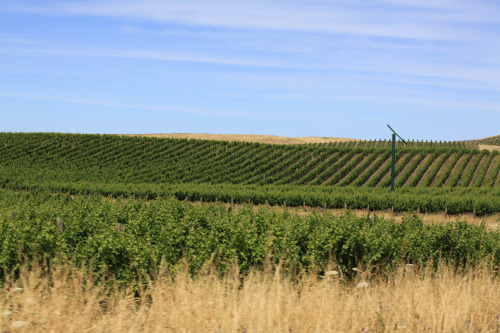
The story of how Wasco, California was transformed into a centre of industrialised farming is a good illustration of how the outcome may be interpreted differently depending upon the academic discipline of the observer. In his chapter, Industrialised Farming and the Rural Community, Walter Goldschmidt (1978) argues that both the physical and social environment determined what would happen in Wasco.
Building a farming community on lands that required irrigation entailed high capital expenditure. To maximise the return on investment, it was inevitable that production would be intensified and that farmers would be encouraged to mechanise production, where possible, and hire cheap labour, where necessary.
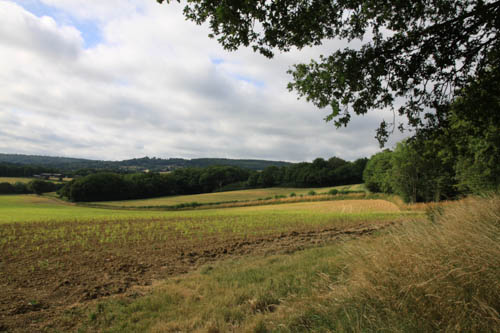
Goldschmidt also highlights the effects this had on the social and physical landscape. As production intensified, features like flowerbeds and barnyards became luxuries and eventually disappeared. In terms of social implications, Goldschmidt argues that urban values began to overtake rural ones in various ways. For example, as the economic interests of major corporations started to filter down to the local level, the community became less important as a unit of social action. At the individual level, farmers came to identify more as business entrepreneurs than as subsistence producers.
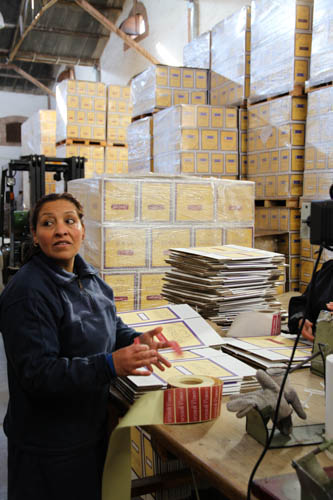
The existence of a large farm labour population was still important, even in a highly automated industry. Nonetheless, labour patterns changed, with a move away from permanent to short-term contracts. Linking back to the social implications, Goldschmidt highlights that an influx of labourers from other regions contributed to a shift away from the close knit rural community, as the population increased and demographics reflected a wider array of socioeconomic backgrounds.
Reading this some 65 years after it was written in 1947, one can’t help but feel a sense of foreboding for the future of farming in Wasco. Goldschmidt does not deal explicitly with the environmental implications of intensification, but from our contemporary perspective, we can guess that crop specialisation (monoculture) and intensification in a desert environment would eventually lead to severe environmental degradation.
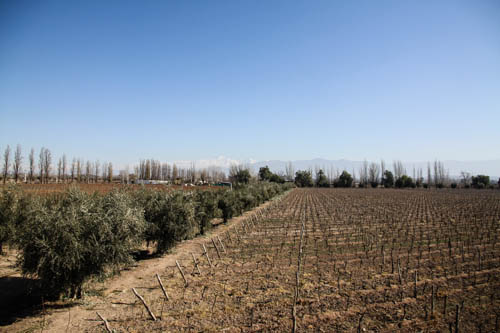
One of the questions we discussed in class was whether it is possible to identify the origins of agricultural industrialisation. The answer is ambiguous, at best. Classical interpretations of the origins of industry suggest that it arose in an urban context and was associated with the production of non-food commodities, such as textiles. However, two of the articles we read challenge this perspective.
In her article, The Agrarian Origins of Capitalism, Ellen Meiksins Wood (1998) argues that capitalism was born in the English countryside, rather than the city. It is a controversial view and Wood anticipates potential arguments against hers. For example, a potential counterargument is that the exploitation of wage labour is at the heart of capitalism, whereas the industrialisation of agriculture generally reflects a movement away from this, because it tends to entail a reduction in wage labour as production is mechanised.
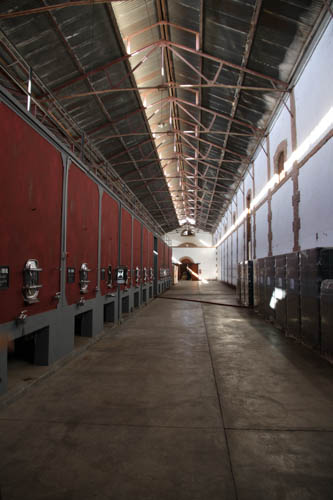
Wood says this is ‘fair enough’, so long as we recognise that English agriculture was already operating according to the principles of competition, accumulation and profit-maximization, “the pre-conditions ... for the development of a mature capitalism that would indeed be based on the mass exploitation of wage labor”.
An example of the sort of counterargument that Wood is anticipating can be found in David Goodman and Michael Redclift’s (2002: 61) chapter, The Passing of Rural Society. They argue that capitalism was established in industry and that “agriculture was, to a significant extent, the beneficiary of this process”.
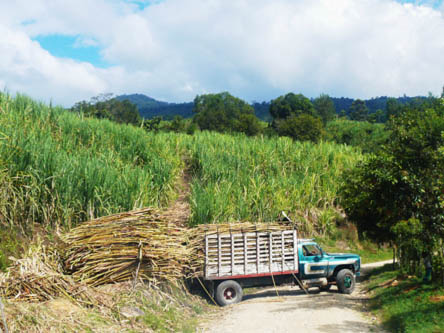 Photo courtesy of Aimee Baker
Photo courtesy of Aimee Baker
Sidney Mintz’s (1985) chapter, Production, focuses on the colonial sugar plantations of the 16th and 17th centuries, which he views as the precursor to industry in Europe. Like Wood, Mintz (1985: 48) anticipates resistance to his argument: “the idea that there might have been “industry” on the colonial plantation before it existed in the homeland may seem heretical” because it was associated with slave, rather than wage labour, and because industry is typically associated with an urban context and with non-food consumables. He claims that this should not “interfere with a recognition of the industrial aspects of plantation development", and I agree.
Mintz (1985: 47) tells us that sugar cane has to be cut when ripe and ground as soon as it is cut, so much of the industrial processing of the cane must take place on the plantation. This leads to the specialisation and division of labour. Time is also important; cutting crews and processors must be coordinated, placing an emphasis on scheduling and discipline. All these are “features associated more with industry than with agriculture – at least in the sixteenth century”.

At the time when we covered this topic, I was engrossed in series 3 of Downton Abbey. That week I was interested to see this theme pop up in the show. Matthew had expressed concern that their extensive land holdings were being left idle and suggested that they be given over to ‘husbandry’. In the next episode, he spoke to the family’s financial advisor who agreed that “It’s never been more vitally important to maximise the assets of a place like this and run it with a solid business head”.
This reflects changes to the pattern of landholding in England associated with a movement away from the ‘tripartite system’ of landlords, tenants and labourers identified by Marx, where tenants and labourers worked the land that they rented from landlords, to one where the majority of farms are owner-occupied. Both Wood (1998) and Goodman and Redclift (2002) discuss this in detail.
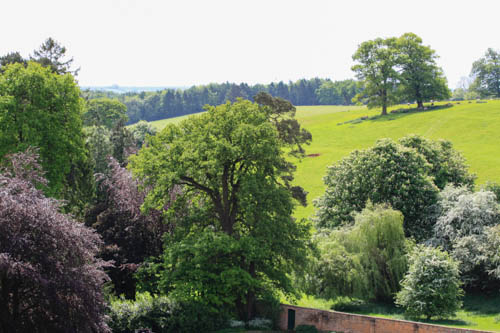
The fact that this was picked up in this popular television show was important for me, because it brought it down from the lofty realm of academic theory and highlighted that it must have indeed played a significant role in shaping our landscape, both the physical landscape and the socio-cultural landscape, just as in the Wasco case study. In this way it helped me to make important connections between theory and practice.
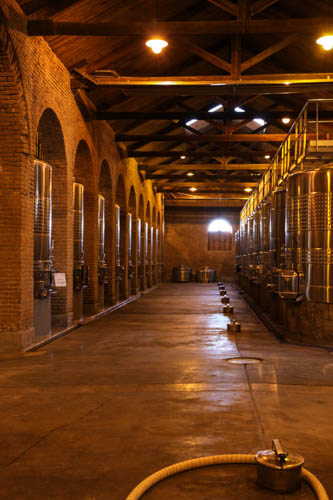
References
Goldschmidt, W. 1978 [1947]. As You Sow: Three Studies in the Social Consequences of Agribusiness. Montclair: Allanheld, Osmun and Co.
Goodman, D. and Redclift, M. 1991. Refashioning Nature: Food, Ecology and Culture. London: Routledge.
Mintz, S.W. 1986 [1985]. Sweetness and Power: The Place of Sugar in Modern History. New York: Penguin.
Wood, E.M. 1998. The Agrarian Origins of Capitalism. Monthly Review: An Independent Socialist Magazine, 50 (3), 18-32.
Thanks to Aimee Baker, of Aim Creative Photos, for the photo of the sugarcane plantation.
 Vix |
Vix |  3 Comments |
3 Comments | 
Reader Comments (3)
I think the point at the start of this post about 'industrialisation of agriculture' (or any word for that matter) meaning different things for different people is a really important one that we so often forget. The differences you draw out from the various academics in this article is a good indicator of just how diverse thought can be on one subject. I'm not going to attempt to analyse the 'nitty gritty' of what each academic said (because I don't know that I really understand!) but I do find it so interesting (as you allude to at the end) reading with the benefit of hindsight and bing able to see the devastating effects such industry has had on (most particularly) the environment. I look forward to your post about this!!!
Hey Cha, thanks for your comment. It is important to get this kind of feedback, because without meaning to you have made me realise that this is post is too academic for the blog. I want to make these issues accessible and I have clearly failed to do that. Mum said the same thing. I am working on a new version of this post. I will send it to you when it has been updated. Xx
Hey Cha, I have updated the post. I think it is now much more readable and accessible. At least I hope so. Let me know :) x